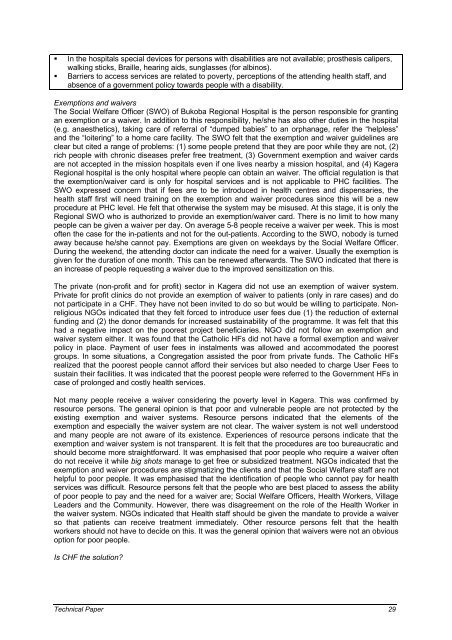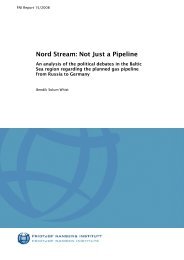equity implications of health sector user fees in tanzania
equity implications of health sector user fees in tanzania
equity implications of health sector user fees in tanzania
You also want an ePaper? Increase the reach of your titles
YUMPU automatically turns print PDFs into web optimized ePapers that Google loves.
� In the hospitals special devices for persons with disabilities are not available; prosthesis calipers,<br />
walk<strong>in</strong>g sticks, Braille, hear<strong>in</strong>g aids, sunglasses (for alb<strong>in</strong>os).<br />
� Barriers to access services are related to poverty, perceptions <strong>of</strong> the attend<strong>in</strong>g <strong>health</strong> staff, and<br />
absence <strong>of</strong> a government policy towards people with a disability.<br />
Exemptions and waivers<br />
The Social Welfare Officer (SWO) <strong>of</strong> Bukoba Regional Hospital is the person responsible for grant<strong>in</strong>g<br />
an exemption or a waiver. In addition to this responsibility, he/she has also other duties <strong>in</strong> the hospital<br />
(e.g. anaesthetics), tak<strong>in</strong>g care <strong>of</strong> referral <strong>of</strong> “dumped babies” to an orphanage, refer the “helpless”<br />
and the “loiter<strong>in</strong>g” to a home care facility. The SWO felt that the exemption and waiver guidel<strong>in</strong>es are<br />
clear but cited a range <strong>of</strong> problems: (1) some people pretend that they are poor while they are not, (2)<br />
rich people with chronic diseases prefer free treatment, (3) Government exemption and waiver cards<br />
are not accepted <strong>in</strong> the mission hospitals even if one lives nearby a mission hospital, and (4) Kagera<br />
Regional hospital is the only hospital where people can obta<strong>in</strong> an waiver. The <strong>of</strong>ficial regulation is that<br />
the exemption/waiver card is only for hospital services and is not applicable to PHC facilities. The<br />
SWO expressed concern that if <strong>fees</strong> are to be <strong>in</strong>troduced <strong>in</strong> <strong>health</strong> centres and dispensaries, the<br />
<strong>health</strong> staff first will need tra<strong>in</strong><strong>in</strong>g on the exemption and waiver procedures s<strong>in</strong>ce this will be a new<br />
procedure at PHC level. He felt that otherwise the system may be misused. At this stage, it is only the<br />
Regional SWO who is authorized to provide an exemption/waiver card. There is no limit to how many<br />
people can be given a waiver per day. On average 5-8 people receive a waiver per week. This is most<br />
<strong>of</strong>ten the case for the <strong>in</strong>-patients and not for the out-patients. Accord<strong>in</strong>g to the SWO, nobody is turned<br />
away because he/she cannot pay. Exemptions are given on weekdays by the Social Welfare Officer.<br />
Dur<strong>in</strong>g the weekend, the attend<strong>in</strong>g doctor can <strong>in</strong>dicate the need for a waiver. Usually the exemption is<br />
given for the duration <strong>of</strong> one month. This can be renewed afterwards. The SWO <strong>in</strong>dicated that there is<br />
an <strong>in</strong>crease <strong>of</strong> people request<strong>in</strong>g a waiver due to the improved sensitization on this.<br />
The private (non-pr<strong>of</strong>it and for pr<strong>of</strong>it) <strong>sector</strong> <strong>in</strong> Kagera did not use an exemption <strong>of</strong> waiver system.<br />
Private for pr<strong>of</strong>it cl<strong>in</strong>ics do not provide an exemption <strong>of</strong> waiver to patients (only <strong>in</strong> rare cases) and do<br />
not participate <strong>in</strong> a CHF. They have not been <strong>in</strong>vited to do so but would be will<strong>in</strong>g to participate. Nonreligious<br />
NGOs <strong>in</strong>dicated that they felt forced to <strong>in</strong>troduce <strong>user</strong> <strong>fees</strong> due (1) the reduction <strong>of</strong> external<br />
fund<strong>in</strong>g and (2) the donor demands for <strong>in</strong>creased susta<strong>in</strong>ability <strong>of</strong> the programme. It was felt that this<br />
had a negative impact on the poorest project beneficiaries. NGO did not follow an exemption and<br />
waiver system either. It was found that the Catholic HFs did not have a formal exemption and waiver<br />
policy <strong>in</strong> place. Payment <strong>of</strong> <strong>user</strong> <strong>fees</strong> <strong>in</strong> <strong>in</strong>stalments was allowed and accommodated the poorest<br />
groups. In some situations, a Congregation assisted the poor from private funds. The Catholic HFs<br />
realized that the poorest people cannot afford their services but also needed to charge User Fees to<br />
susta<strong>in</strong> their facilities. It was <strong>in</strong>dicated that the poorest people were referred to the Government HFs <strong>in</strong><br />
case <strong>of</strong> prolonged and costly <strong>health</strong> services.<br />
Not many people receive a waiver consider<strong>in</strong>g the poverty level <strong>in</strong> Kagera. This was confirmed by<br />
resource persons. The general op<strong>in</strong>ion is that poor and vulnerable people are not protected by the<br />
exist<strong>in</strong>g exemption and waiver systems. Resource persons <strong>in</strong>dicated that the elements <strong>of</strong> the<br />
exemption and especially the waiver system are not clear. The waiver system is not well understood<br />
and many people are not aware <strong>of</strong> its existence. Experiences <strong>of</strong> resource persons <strong>in</strong>dicate that the<br />
exemption and waiver system is not transparent. It is felt that the procedures are too bureaucratic and<br />
should become more straightforward. It was emphasised that poor people who require a waiver <strong>of</strong>ten<br />
do not receive it while big shots manage to get free or subsidized treatment. NGOs <strong>in</strong>dicated that the<br />
exemption and waiver procedures are stigmatiz<strong>in</strong>g the clients and that the Social Welfare staff are not<br />
helpful to poor people. It was emphasised that the identification <strong>of</strong> people who cannot pay for <strong>health</strong><br />
services was difficult. Resource persons felt that the people who are best placed to assess the ability<br />
<strong>of</strong> poor people to pay and the need for a waiver are; Social Welfare Officers, Health Workers, Village<br />
Leaders and the Community. However, there was disagreement on the role <strong>of</strong> the Health Worker <strong>in</strong><br />
the waiver system. NGOs <strong>in</strong>dicated that Health staff should be given the mandate to provide a waiver<br />
so that patients can receive treatment immediately. Other resource persons felt that the <strong>health</strong><br />
workers should not have to decide on this. It was the general op<strong>in</strong>ion that waivers were not an obvious<br />
option for poor people.<br />
Is CHF the solution?<br />
Technical Paper 29













